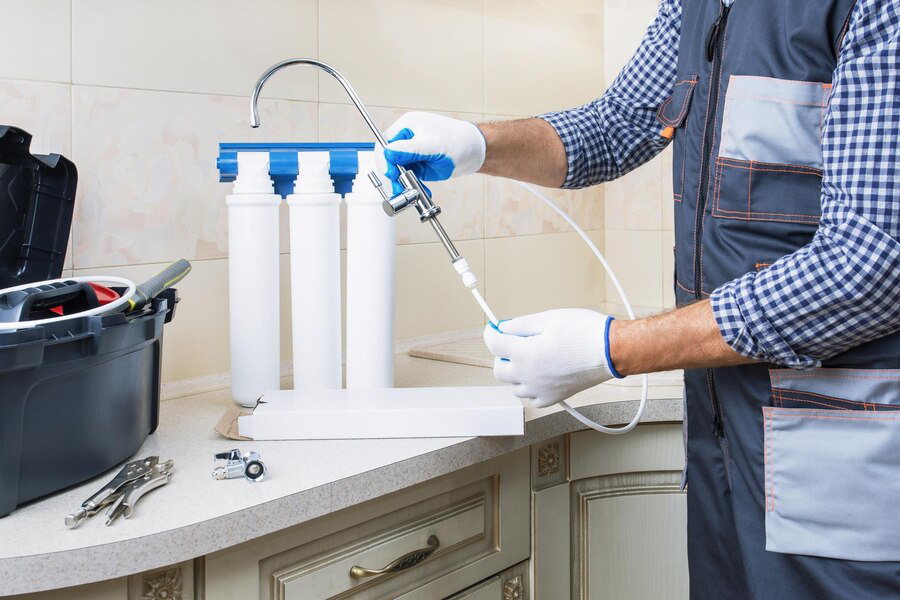In today’s world, where clean water is a fundamental necessity, understanding how water filters work to improve water quality is crucial. From the convenience of home filtration systems to the technology behind them, water filters play a significant role in ensuring we have access to safe and clean drinking water. Let’s dive into the world of water filters and explore how they enhance the quality of our water.
What Is a Water Filter?
A water filter is a device engineered to purify water by removing various impurities through physical, chemical, or biological methods. Its primary function is to ensure that the water we consume is cleaner and safer. The basic principle behind a water filter is simple: water is directed through the filter, which uses a combination of barriers and processes to trap and eliminate contaminants. This results in the flow of clean, filtered water.
Different types of filters utilize various mechanisms to achieve this goal. For instance, physical barriers like mesh screens can catch larger particles, while chemical processes, such as adsorption, address smaller impurities like chlorine. By employing these methods, water filters help enhance the quality of our drinking water and contribute to overall health and well-being.

Types of Water Filters
To truly appreciate how water filters improve water quality, it’s helpful to understand the different types available:
Activated Carbon Filters
These are among the most common types of water filters. They use activated carbon to remove impurities through adsorption. Activated carbon is highly porous and can trap contaminants like chlorine, volatile organic compounds (VOCs), and even some heavy metals. These filters are effective at improving taste and odor.
Reverse Osmosis Filters
This type of filter uses a semi-permeable membrane to remove contaminants from water. The process involves forcing water through the membrane, which removes impurities such as dissolved salts, bacteria, and other particles. Reverse osmosis filters are highly effective and often used in conjunction with other filtration systems for comprehensive purification.
UV Filters
Ultraviolet (UV) filters use UV light to kill bacteria, viruses, and other microorganisms. The UV light damages the DNA of these pathogens, rendering them harmless. UV filters are great for ensuring microbial safety but don’t remove chemicals or sediments.
Ceramic Filters
Ceramic filters use a porous ceramic material to filter out bacteria, sediments, and other large particles. The small pores in the ceramic material trap contaminants, allowing clean water to pass through. They are often used in portable water filters and are known for their durability.
Ion Exchange Filters
These filters use ion exchange resins to remove certain types of contaminants, such as hard water minerals (calcium and magnesium) and some heavy metals. They work by exchanging harmful ions in the water with harmless ones, thereby reducing water hardness and improving taste.
How Water Filters Improve Water Quality
Water filters enhance water quality in several ways. Here’s a closer look at some of the key benefits:
Removal of Contaminants
One of the primary functions of water filters is to remove contaminants from water. These contaminants can include:
- Chlorine and Chloramine: Often used in municipal water supplies to disinfect, these chemicals can affect the taste and odor of water. Activated carbon filters are particularly effective at removing these substances.
- Heavy Metals: Contaminants like lead, mercury, and cadmium can be harmful if ingested. Reverse osmosis filters and certain activated carbon filters can effectively remove these metals.
- Microorganisms: Bacteria, viruses, and protozoa can pose health risks. UV filters are excellent for killing these microorganisms, making the water safe to drink.
- Sediments and Particles: Sand, silt, and rust can make water appear dirty and affect its taste. Ceramic filters and sediment filters can effectively remove these particles.
Improving Taste and Odor
Water filters can greatly enhance the taste and smell of water. Chlorine and other chemicals used in water treatment can leave an unpleasant taste and odor. Activated carbon filters are particularly effective at improving taste and odor by removing these chemicals. This can make drinking water more enjoyable and encourage people to drink more water, which is beneficial for overall health.
Protecting Plumbing and Appliances
Contaminants in water can cause damage to plumbing fixtures and appliances. Sediments and minerals can lead to clogging and wear and tear. By using water filters, you can reduce the amount of sediment and minerals that enter your plumbing system, thereby extending the lifespan of your pipes, faucets, and appliances.
Enhancing Safety
One of the most critical benefits of water filters is their role in enhancing safety. Contaminants like bacteria and viruses can cause gastrointestinal issues and other health problems. By removing these harmful microorganisms, UV filters and other advanced filtration systems provide an extra layer of protection, especially in areas where water quality may be a concern.
Reducing Health Risks
Certain contaminants in water, such as heavy metals and chemicals, can pose long-term health risks. For example, long-term exposure to lead can lead to developmental issues in children and cardiovascular problems in adults. By effectively removing these contaminants, water filters help reduce the risk of health problems associated with contaminated water.
Choosing the Right Water Filter
Assess Your Water Quality
Before selecting a water filter, start by testing your water to identify any contaminants present. This initial assessment helps you choose a filter designed to target those specific impurities, ensuring that the filter effectively addresses your water quality issues.
Consider Your Needs
Evaluate what you require from a water filter. Are you aiming to improve the taste and odor, eliminate specific contaminants, or ensure safety from microorganisms? Understanding your needs will guide you in selecting a filter that meets your particular objectives.
Check Filter Specifications
Examine the specifications of potential filters and look for certifications from organizations like NSF International. These certifications confirm that the filter meets established performance standards, ensuring it effectively removes contaminants and performs as advertised.
Think About Maintenance
Consider the maintenance requirements of the filter you choose. Some filters need regular cleaning or replacement of cartridges. Evaluate how much time and effort you’re willing to invest in maintaining your filtration system to keep it functioning optimally.
Budget
Water filters vary widely in price, from affordable pitcher filters to higher-end reverse osmosis systems. Determine your budget and find a filter that fits within it while meeting your filtration needs. Balance cost with features and effectiveness to make the best choice.
Maintenance and Replacement
Proper maintenance is essential for ensuring that your water filter continues to perform effectively. Here are some general maintenance tips:
- Regular Replacement: Most filters need to be replaced periodically to maintain their effectiveness. Follow the manufacturer’s recommendations for replacement intervals.
- Clean the Filter: Some filters, like ceramic filters, may need periodic cleaning. Follow the manufacturer’s instructions for cleaning to ensure optimal performance.
- Check for Leaks: Inspect your filter system regularly for leaks or any signs of damage. Address any issues promptly to prevent further problems.
- Keep the Filter Area Clean: Ensure that the area around your filter is clean and free from debris. This helps maintain the overall performance of the system.
Boost Your Water’s Purity with Cutting-Edge Filters
Investing in cutting-edge water filters can significantly enhance the purity of your tap water. Modern filtration technologies, such as advanced carbon blocks and reverse osmosis systems, are designed to remove a wide range of contaminants, including chlorine, heavy metals, and microorganisms. These state-of-the-art filters ensure that your water is not only cleaner but also safer and better-tasting.
With a focus on innovation, cutting-edge filters provide superior performance compared to older models. They offer greater efficiency and longer-lasting results, giving you peace of mind knowing that every drop you drink is of the highest quality. Embracing these advanced filtration solutions is a step towards healthier, more enjoyable water.
Maximize Water Quality with Effective Filtration Solutions
Effective filtration solutions are key to maximizing the quality of your drinking water. By utilizing high-performance filters, you can address various water quality issues such as unpleasant taste, odor, and harmful contaminants. These solutions are designed to deliver clean, safe water by targeting specific impurities, ensuring that your water meets the highest standards.
Choosing the right filtration system involves evaluating your water’s specific needs and the performance of different filters. With effective filtration solutions, you can significantly improve water quality, enhance its safety, and enjoy better-tasting water. Investing in a reliable filtration system is essential for achieving optimal water purity and overall health.
Conclusion
Water filters are crucial for improving the quality of drinking water by removing contaminants, enhancing taste, and ensuring safety. Advanced filtration technologies provide cleaner and healthier water at home. Effective filtration solutions address issues like unpleasant tastes and harmful impurities, offering peace of mind for households. For expert advice on selecting and maintaining the best water filters, contact EZI Plumbing in Valley Bay, AU, at 0448467788. Achieving the highest standard of water quality can lead to a healthier and more enjoyable experience.

